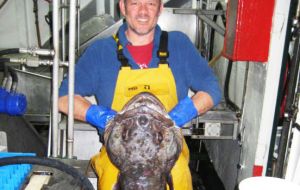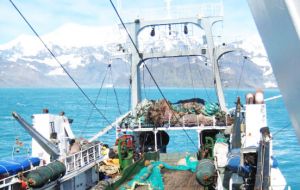MercoPress. South Atlantic News Agency
BAS scientific research survey of South Georgia fish resources
 Dr Mark Belchier holds a Patagonian toothfish (Pic BAS)
Dr Mark Belchier holds a Patagonian toothfish (Pic BAS) Every two years BAS leads a scientific research survey of the fish resources on behalf of the Government of South Georgia and South Sandwich Islands. This time Dr. Mark Belchier from BAS was head of the team of experts that carried out the survey.
The team of seven people included four BAS ecologists (Dr. Belchier, Sue Gregory, Simeon Hill and Vicki Foster), accompanied by a colleague from CEFAS (Vlad Laptikhovsky), a CCAMLR international observer (Pete Lafitte, from South Africa) and UK fishing captain (Len Featherstone).
The 2017 survey was conducted from a commercial fishing vessel over 12 days in January and February. Trawls were carried out all around the island of South Georgia and Shag Rocks and at each location the size, composition and biological characteristics of the fish caught were sampled and recorded.
These data will form the basis upon which sustainable catch limits for the mackerel icefish are set for the following season at the annual meeting of CCAMLR in October in Hobart.
In addition to information on the size of the mackerel icefish stock, the survey also provides new data on the abundance of juvenile Patagonian toothfish and a wide range of other fish species such as the marbled rock cod which was over-fished in the 1970s, but is thought to be slowly recovering at South Georgia following a total ban on fishing 30 years ago.
In addition to assessing changes in the composition and abundance of fish populations over time, the survey is also used to collect samples for a range of scientific collaborations between BAS and international partners. These include food web and molecular studies and monitoring microplastics in the marine environment. The survey team also deployed HD cameras on the trawl net in order to provide data on both fish behaviour and habitat type. Hours of analysis of video footage await the returning science team, said Dr. Belchier in first report.




Top Comments
Disclaimer & comment rulesCommenting for this story is now closed.
If you have a Facebook account, become a fan and comment on our Facebook Page!